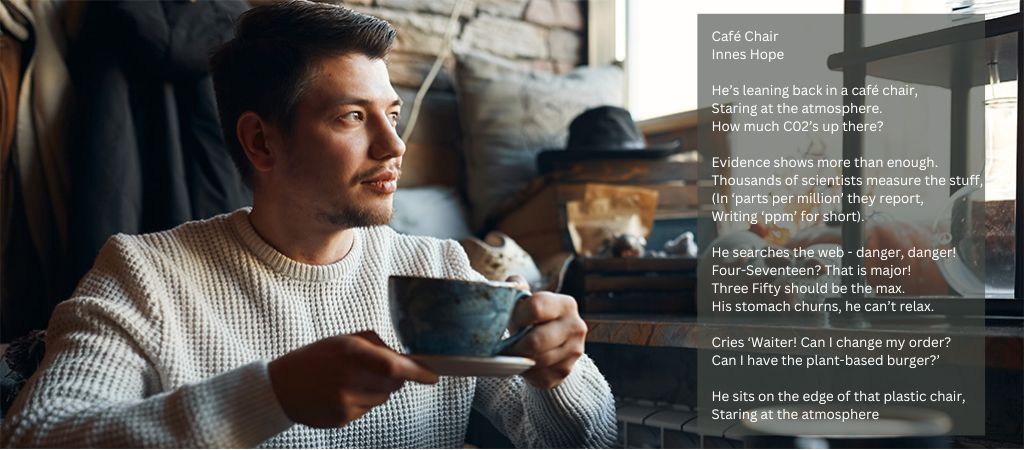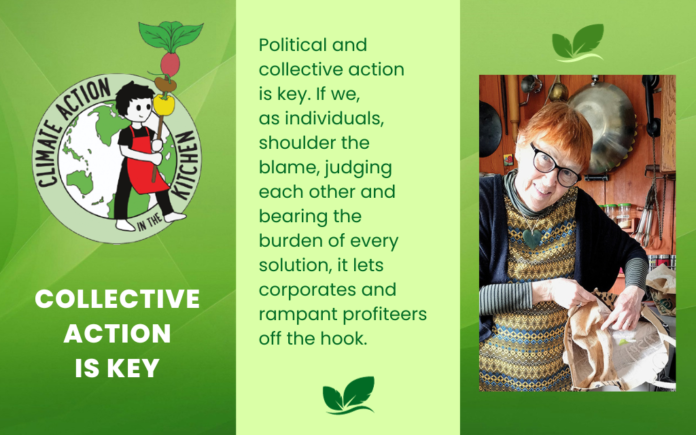The kitchen: heart of the home, where lowering our carbon footprint can happen in leaps and bounds while we enjoy the whole process! Well, that’s what I was enthusing about with a chap I met recently. We were discussing how the world could be a better place, and the conversation was going well – until.
“Climate change,” he scowled. “They’re calling it the climate crisis now. We have a housing crisis, a cost-of-living crisis. Climate change, yes, but not a crisis. They want to blame us. We can’t fix the problem, but they want us to think we can get us buying green this and that. More stuff. Bad for the environment. Good for business. Eating plants and alternative transport isn’t going to save the world. Being all caught up in little feel-good steps like that distracts us from pressuring the government. They’re the ones who have to step up. Corporates and governments around the world. The big players. The system has to change.”
I was about to agree about stepping up, but he kept talking.
“They want us to drink oat milk, stop cooking with gas, give up meat and cheese, buy an electric car. All that lithium, plastic, and metal … bad for the environment. As for those plant milk tetra paks. It’s pollution. I’m passionate about the environment … That’s where we can really make a difference.”
I didn’t mention the obvious: that climate change is devastating the environment. But I was interested to hear what he was doing. Ditching plastic, composting, tree planting, beach clean-ups, op-shopping. Reducing, reusing, repurposing, recycling. On an individual level, the same little feel-good steps I’m taking. Except. He is avoiding alternative transport, regenerative energy and plant-based eating, the very areas Big Oil and Big Ag want us to avoid. Where individuals can make a noticeable difference. Interesting.
We parted, agreeing, though, that political and collective action is key. If we, as individuals, shoulder the blame, judging each other and bearing the burden of every solution, it lets corporates and rampant profiteers off the hook. This intensifies the problem, and everyone suffers more. Especially the increasingly disenfranchised poor.
No single person or country can save the world. But as individuals supporting wider-good action campaigns, voting, living more in harmony with nature, and helping each other in the community, we’re part of the movement effecting change. Our little steps do add up. This gives me hope, and the strength to carry on.
If we ever meet again and he asks for ‘little step’ kitchen tips, I hope he’ll enjoy chatting over a delicious plant-based lunch…

Reduce
- Using fewer luxury and imported ingredients and replacing them with locally grown and manufactured foods reduces food-mile emissions and strengthens food security. Walnuts, for example, instead of cashews. Australian sultanas and staples we can’t grow, instead of those from the other side of the planet.
- Keeping everything visible in the pantry and fridge helps reduce waste when ‘out of sight, out of mind’ ingredients pass their use-by date.
- Getting creative with left-overs and unused produce helps get us closer to zero waste. If you have a juicer, juice vege stalks, and other produce you might otherwise throw out. Great for stock.
- Walking, cycling, mobility-scooting and taking public transport to the shops reduces fossil fuel use. If you can’t, and you don’t have an electric or hybrid car, make fewer, more efficient trips. Maybe take turns with another household.
- Cooking without oil and fat radically reduces the need for dish detergent, helps prevent ‘fat-bergs’ forming in drains, and results in healthier grey-water and healthier air.
- Pressure cooking uses much less energy, saves a lot of time, and makes food more digestible. More nutrients are made available too. Great for beans and beetroot!
- Being minimalistic with cleaning and personal care products, reduces our environmental footprint. Using fewer products from businesses that aren’t ‘greenwashing,’ helps up-the-ante in the marketplace.
- Choosing essential appliances with a good energy-star rating and resisting the impulse to buy novel, single-application electrical gadgets that end up not being used reduces the plundering of the world’s natural resources and junk in landfills.
- Choosing an electric stove rather than gas reduces fossil fuel use. New research also reveals that regular fumes from cooking with gas indoors are damaging to our health.
- Filling the dishwasher before using it, turning taps and lights off when not in use, covering the pot when steaming or boiling – we do that already, surely?
Reuse and Repurpose
- Reusing glass jars adds value to homemade pickles and jams.
- Using reusable ‘unpaper’ towels, cloth serviettes, table-mats in natural materials, and waxed-cloth food wraps and bowl covers, is better for the environment.
- Motel shower caps make great bowl covers! Or reuse Gran’s food covers or make some from old net curtains.
- Using mum’s old hand utensils saves electricity, strengthens the arm muscles, and enhances your retro kitchen look. Great to have in a power cut.
- If you’ve no room to grow food, or the landlord won’t even allow pot plants, guerrilla gardening or a community garden might be for you. Guerrilla gardening is growing food on neglected public land.
Recycle
- It is better to avoid buying products that need to be recycled. A worrying amount of stuff we put out for recycling is not recycled, despite it being clean and in the right categories. Recycling as the final straw helps us prevent, reduce, reuse, and repurpose, avoiding waste in the first place.
- Tetra Pak/aseptic cartons can now be recycled. They’re made into building board by saveboard.nz. Pressure your local council to provide this service.
- Soft plastics can also now be recycled. They’re made into planter boxes and fence posts. Find your nearest depot via recycling.kiwi.nz/store-locator
- Eating plant-based creates more food scraps for composting and worm-farms than traditional diets. Healthier soil, healthier plants.
- Using genuinely compostable products, e.g. sponges, wooden brushes, etc, causes less pollution.
- Packaging made of natural materials can be composted, reused, and more effectively recycled, e.g. oatmeal in paper bags, peanut butter in glass jars. Don’t be fooled by brown-paper-looking plastic. Check the compost-ability of plastic-lined paper and card.
- When the plastic lining in your jute shopping bag is disintegrating (see image), peel it off and put it in the soft plastic recycling. The bag looks as good as new. Happy, sustainable, eco-shopping!






